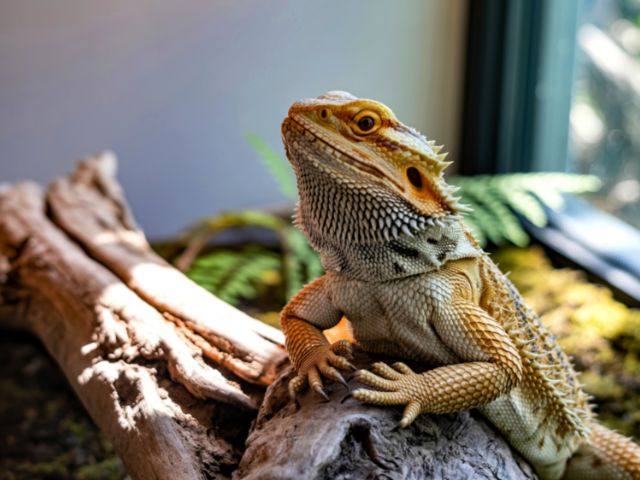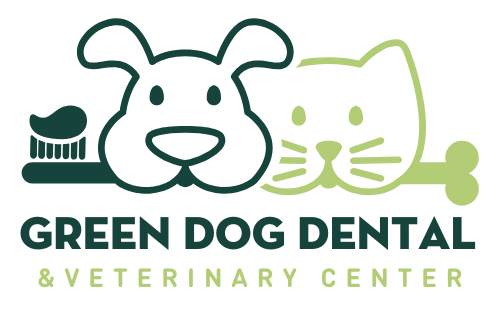Bearded Dragon Care at Green Dog Dental & Veterinary Center in Van Nuys, CA
Bearded dragons are remarkable reptiles—calm, personable, and surprisingly attentive to their environment. But despite their easygoing reputation, they require precise, species-specific care to remain healthy. At Green Dog Dental & Veterinary Center, we provide expert, evidence-based guidance for every stage of bearded dragon ownership, from proper habitat design to nutrition, hydration, wellness exams, and early detection of illness.
Whether you’re new to reptile care or already a seasoned keeper refining your husbandry practices, our team delivers advanced reptile veterinary support right here in Van Nuys, CA. We understand exactly what these desert-origin lizards need—strong UVB output, correct temperature gradients, balanced diets, and careful observation of subtle behavioral cues.

Do Bearded Dragons Need Veterinary Care?
Absolutely. Regular veterinary care is essential for identifying nutritional imbalances, parasites, metabolic bone disease (MBD), and early shifts in weight or behavior that may signal deeper health issues. Annual wellness exams with a reptile-experienced veterinarian help ensure that your dragon’s husbandry, growth, and diet remain on track year after year.
If you’re searching for a reliable bearded dragon vet in Van Nuys, CA, our team at Green Dog Dental & Veterinary Center is equipped to support dragons of all ages—babies, juveniles, and adults.
Types of Bearded Dragons
There is one primary species kept as pets—the Central Bearded Dragon (Pogona vitticeps)—but a wide variety of morphs exist, ranging in color, pattern, and scale type.
- Smallest species: Pygmy Bearded Dragon (Pogona henrylawsoni)
- Largest species: Central Bearded Dragon (Pogona vitticeps)
- Common morphs: Leatherback, silkback, hypomelanistic, translucent, dunner, and more.
These morphs differ in appearance, not in husbandry requirements, making proper care universally important across all types.
Do Bearded Dragons Make Good Pets?
For owners ready to commit to appropriate heating, lighting, nutrition, and handling, bearded dragons can be excellent companions. Their temperament is generally calm and friendly, and their routines often become predictable with time. Once their habitat is correctly set up, their care becomes manageable and rewarding.
Bearded Dragon Habitat Requirements
Correct habitat setup is crucial—not optional. A poorly maintained environment is the fast track to metabolic bone disease, respiratory illness, and behavioral stress.
A proper enclosure includes:
- 40–120 gallon terrarium (adult size)
- Basking bulb + UVB tube lighting (UVA recommended as well)
- Temperature gradient:
- 95–110°F basking
- 75–85°F cool side
- Humidity: 30–40%
- Safe substrate: Tile, reptile carpet, or paper—not sand
- Environmental enrichment: Branches, hides, rocks, sturdy décor
- Shallow water dish for drinking and humidity stability
Bearded dragons sleep 8–12 hours at night and prefer hammocks, hides, or branches for resting. Their lights must be turned off at night—darkness is necessary for proper sleep cycles.
UVB & Lighting Essentials
A strong UVB source is non-negotiable. The ideal setup is:
- 10.0 T5 high-output UVB tube
- Spanning at least half the tank
- Combined with UVA and appropriate basking heat
UVB supports digestion, energy levels, bone health, and calcium metabolism. Without it, dragons rapidly develop severe, irreversible conditions such as MBD.
Handling & Housing Behavior
Most bearded dragons tolerate gentle handling well, and many enjoy being held once they bond with their owner.
Handling tips:
- Slide your hand under the chest.
- Support both the belly and tail.
- Never grab from above—this triggers a fear response.
Bearded dragons must live alone. Co-housing leads to stress, fights, and injuries, even in seemingly peaceful pairs.
Diet & Feeding Guide
Bearded dragons are omnivores, but their nutritional needs change dramatically with age.
Baby Dragons (0–5 months)
- 70–80% insects
- 20–30% greens/vegetables
- 20–60 small crickets per day, split into multiple feedings
Juveniles
- 50% insects
- 50% vegetables
Adults
- 70–80% vegetables
- 20–30% insects
Safe Foods
Greens/veggies (daily):
- Collard greens
- Mustard greens
- Turnip greens
- Squash, zucchini
- Green beans
- Bell peppers (moderation)
Fruits (treats only):
- Strawberries, blueberries, raspberries, blackberries
- Apples (peeled)
- Mango
- Watermelon, cantaloupe
- Pineapple
- Oranges (rarely)
Insects:
- Crickets
- Dubia roaches
- Worms (superworms, mealworms sparingly)
- Hornworms, calci-worms
Foods to Avoid
- Avocado
- Rhubarb
- Fireflies
- All processed human food
Hydration
Dragons drink from bowls, from droplets on décor, and absorb moisture from vegetables. Hydration is a key part of preventing impaction, overheating, and lethargy.
Shedding, Behavior & Lifespan
- Shedding: Babies shed frequently; adults shed several times per year.
- Lifespan: 10–15 years in captivity.
- Noise/smell: They rarely make noise and typically have no odor if the enclosure is kept clean.
- Color change: They may darken when cold or stressed; lighten when warm or relaxed.
Bearded dragons also have a parietal “third eye” that detects light and overhead movement—a survival adaptation from their wild desert habitat.
Reproduction Facts
- Eggs per clutch: 15–30
- Fertility signs: White, firm eggs with visible veins when candled
- Unfertilized eggs: Dispose of them—they will not develop
- Age dragons stop laying: ~4–6 years old
Bearded Dragon Health Concerns
Dragons can develop a wide range of medical conditions. Some require urgent care.
Common illnesses include:
- Yellow fungus disease
- Metabolic bone disease
- Parasites/worms
- Constipation/impaction
- Hypercalcemia
- Heatstroke
- Respiratory infections
- Diarrhea/vomiting
- Eye/ear infections
- Fungal infections
- Abscesses
- Adenovirus
- Scale rot/mouth rot
- Seizures
- Prolapse
- Dehydration
- Coccidia
- Cancer
Diagnosing Illness
Your veterinarian may use:
- Physical exam
- Fecal testing
- Bloodwork
- X-rays
- Ultrasound
- Cultures or biopsy
When to Seek Immediate Veterinary Care
Bring your dragon in urgently if they:
- Stop eating or drinking
- Produce watery stool
- Show respiratory effort
- Become lethargic
- Have visible injuries
- Appear stressed or ill
Emergency signs include:
- Baby not eating for 48 hours
- Exposure to temperatures below 60°F
- Prolapse
- Seizures
- Significant trauma
- Labored breathing
Prompt veterinary evaluation prevents minor issues from escalating into life-threatening conditions.
Schedule Bearded Dragon Care in Van Nuys, CA
If your bearded dragon needs a wellness exam or urgent care, Green Dog Dental & Veterinary Center is here to help.
Call us at (310) 606-2407 or email [email protected] to schedule your appointment.
Don't forget to follow us on social media: Facebook, Instagram.
